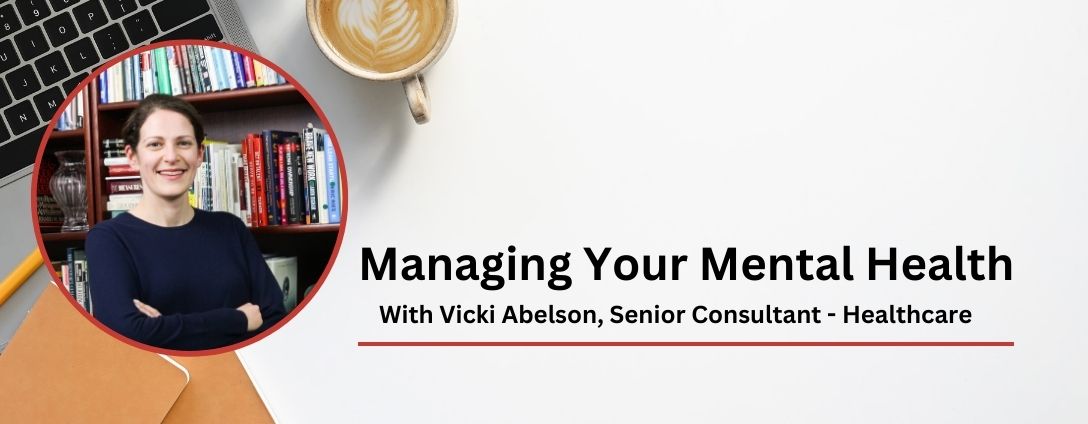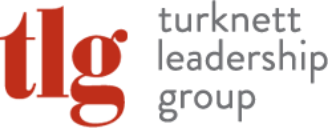
By Jonathan Palombo
Marketing ManagerVicki Abelson has always had a true passion for people. Before she began helping individuals and teams unleash their potential through coaching, Vicki enjoyed an accomplished career in the healthcare industry that would span 15 years. As a result, Vicki understands the critical role that mental health and overall wellbeing play. In this interview, we asked Vicki how she helps her coaching clients to better manage their mental health, how to deal with burnout, and how her background in healthcare has impacted her career as a coach.
Q: Given your background in healthcare, how do you help your clients to better manage their mental health and wellbeing as it relates to their career?
When you work in a fast-paced environment, where others are dependent on you, whether it’s for care or for deliverables, it’s important to create margin in your day. Often we jump from task to task to meeting to email and back to meeting again. It all feels incredibly urgent and important. At the end of the day we are left feeling spent at best and burnout at worst. Creating margin in our days allows us to take breaks, create time for intentional work, and show up more fully for the people that need us. There are a number of things that I encourage my clients to do in order to build that margin in their days.
- Schedule 30 or 50 minute meetings. It’s remarkable how much we can get done when we have focused time. Plus it gives you extra time to focus on meeting follow ups. If you miss the social interaction, schedule a coffee or lunch for true connection time.
- Decide what needs to be done, delegated, or deleted. Our To Do lists can get long. What on your list can you ask someone else to do? What can you move to next week? What can you decide not to do? We all have that line item on our to do list that moves from list to list to list. It’s time to let it go.
- Make time to talk to a trusted friend, coach, or colleague. It’s easy to feel alone and like no one understands you. Find the people that help you feel connected and like you are part of a community.
Q: What advice would you have for someone who is dealing with burnout or high levels of anxiety?
The first thing is to realize that you are not alone. Everyone feels burnout and anxiety from time to time. Stigmatizing these feelings can add a layer of guilt or shame that does not help you move past these feelings. Think of burnout or anxiety as a sign that there is something in your day to day that needs to be resolved. A daily journaling practice can help you uncover patterns or root causes to your feelings. Talking with a coach or a therapist, if needed, can help strengthen your toolkit of practices to help you move from burnout or anxiety. Sometimes all you need is to take a quick walk around the block, but other times it can be helpful to identify the root causes and address each one.
Q: How has your background and experience in healthcare improved your ability to support and coach your clients?
Working in healthcare I was exposed to daily management and operational challenges (workflows, budgets, hiring, etc) and also the more unique challenges like patient safety, clinical outcomes, and staffing. Over the years, I learned to differentiate between what is truly urgent and important and what can wait till later in the week. I learned to understand people’s perspectives and thoughts because there are always so many stakeholders (patients, families, clinicians, administrative leaders, etc). Having a strong sense of empathy and perspective allows me to support my clients no matter what industry they are in.
Q: So much of an employee’s wellbeing can hinge on their work life balance. How do you help your clients better manage that, and how can it benefit them?
As a working mom, work life balance is something that I am always striving towards. I like to remind my clients, and myself, that we are whole people. The pandemic served to highlight the idea that we are not just our work selves and our home selves. We are full selves that lead teams, make tough decisions, cook dinner, and run kids to soccer practice. It’s impossible to be balanced in all moments of the day, but it is possible to find balance over time. What can you delegate, at home or at work?
The rule of thumb I use is that if someone can do it 75% as well as you can, you can delegate it. What can you take off your plate completely? What, on your to do list, aligns with your Core Values? If it’s not aligned, it’s time to think about removing it. Of course, there is so much more, but this is a good place to start.
Q: What caused you to fall in love with coaching while you were working in the healthcare industry? Is it still the same today?
Looking back, I think I’ve always loved coaching. It was always important for me to help my team to do well. I fervently believed that as I grew in my career, it was my responsibility to take my team with me. Helping them think of ideas or make connections between ideas was always one of my favorite parts of leadership. There are so many stories from my work in healthcare that led to my job in coaching today and I am grateful for the work I did then and the work I get to do now.
Q: How has The Leadership Character Model, TLG’s guiding framework for leadership, impacted your coaching journey and how you interact with clients?
When I first saw The Leadership Character Model, I thought, “oh this is interesting.” But as I dove deeper, studied the model, and taught the principles to individual and groups alike, I have been impressed with how relevant and timely the model is. I can think of leaders from my past that strongly favored Respect over Responsibility and vice versa. Having the language of the model helped me to understand why I liked or didn’t like working for these leaders. The model also helps me understand how I show up in my work (am I doing the thing I said I would do) and in my life (am I being courageous? am I holding myself and others accountable? am I empathetic? can I manage my emotions)? Knowing the principles of the Leadership Character model helps me be a better coach and team member.
If you are interested in learning more about Vicki, visit her profile! If you’d like to learn more about how are our team can help you and your employees explore your workplace culture and its impact on employee mental health, please contact us today or give us a call!

